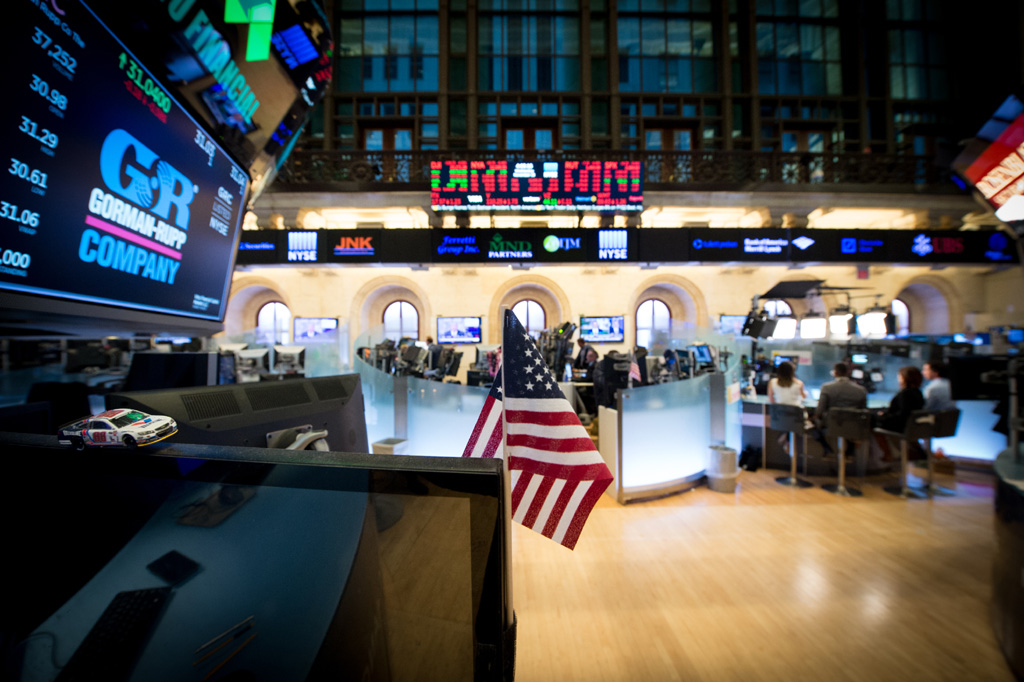 LONDON: World stocks fell for a third straight day on Tuesday after a stinging warning from German chemicals giant BASF about the effects of the global trade war and as hopes dwindled of a hefty US interest rate cut this month.
LONDON: World stocks fell for a third straight day on Tuesday after a stinging warning from German chemicals giant BASF about the effects of the global trade war and as hopes dwindled of a hefty US interest rate cut this month.
With global macroeconomic clouds looming and markets waiting for policy signals from US Federal Reserve chief Jerome Powell on Wednesday, the focus of headlines and sentiment turned to three individual heavyweight stocks.
For Europe, it was an almost 7pc early slump in German chemicals giant BASF after it had blamed a global slowdown and trade war between the United States and China for what one trader described as a "shocking" 30pc profit warning.
Deutsche Bank tumbled another 4pc too - having already dropped 5.4pc the previous day after it axed 18,000 staff - while Apple's overnight drop of more than 2pc on Wall Street after a broker downgrade dragged both global tech sectors lower.
"Both from a bottom-up and top-down perspective, equity market valuations appear far too ambitious," analysts at Morgan Stanley wrote in a note.
It was particularly stark, they said, as the US business cycle was in a downturn and both forward-looking indicators such as global PMIs and global trade are now in contraction territory.
"Indeed, companies have begun cutting their 2019 profit forecasts, citing the trade conflict as a reason," MS added.
In the currency markets, Britain's pound was threatening to slip to a more than 2-year low against the dollar and a 6-month trough versus the euro amid a worsening UK economic outlook and rising fears about a no-deal Brexit.
With the key $1.25 level against the dollar giving way in early Asian trade, traders quickly pushed the British currency down half a percent and it barely budged, even as opposition Labour Party leader Jeremy Corbyn inched closer to backing a second Brexit referendum.
The broader theme though remained the potential reaction to the weaker global outlook from the world's top central banks, especially on what Fed chairman Powell will say during a testimony and grilling from Congress on Wednesday.
Money market futures are still fully pricing in a 25 basis point (bps) cut at the Fed's July 30-31 meeting, but have almost priced out a larger 50 bps move that had been seen as a real possibility just a couple of weeks ago.
Benchmark government bond yields were clawing away from their recent lows and the dollar changed hands at 108.81 yen to build on the more than month high it had set in the previous session.
The dollar index versus a basket of six major currencies was also higher at 97.550, while the euro drooped back under $1.12 for the first since mid June.
"It would be pretty disruptive at this stage for Powell to rule out a cut in July or dampen expectations of a cut in July," said Michael Metcalfe, head of global macro strategy at State Street Global Markets.
"The last few Fed speakers, albeit non-voting speakers, have suggested July is not a done deal ... and even now, if you look at economists' forecasts, there is not a consensus that there will be a move, and yet the market is 100pc priced."
TRADE STRAINS
Wall Street looked set to follow Europe and Asia lower with futures markets indicating falls of around 0.5pc for the main S&P 500, Dow Jones and Nasdaq bourses.
The United States and China are set to relaunch trade talks this week after a two-month hiatus, but a year after their trade war began there is little sign their differences have narrowed.
Overnight in Asia, MSCI's broadest index of Asia-Pacific shares outside Japan dropped 0.45pc but pared earlier losses, having traded at its lowest level since June 19.
Chinese blue-chips ended down 0.25pc, while Hong Kong's Hang Seng fell 0.75pc. Japan's Nikkei put up the only resistance as gains in a few heavyweights in the index helped it edge up 0.15pc.
Apple's suppliers, such as Murata Manufacturing and Taiyo Yuden, fell 2pc and 4pc, however, after Rosenblatt Securities cited a "fundamental deterioration" for the US gadget giant over the next 6-12 months.
In Greater China, suppliers from Hon Hai to AAC Tech also lost between 1.4pc and 3.1pc and in Europe Infineon, ASM and STMicroelectronics slipped about 2pc.
OPEC and its allies agreed last week to extend their supply-cutting deal until March 2020. Brent has risen almost 20pc in 2019 supported by the pact and also tensions in the Middle East, especially concerns about the row over Iran's nuclear programme.
Benchmark Brent crude rose 59 cents to $64.70 a barrel and US West Texas Intermediate crude CLc1 was up 46 cents to $58.12.
"OPEC and its allies are doing their best to support the market," said Tamas Varga, an analyst with PVM. "Oil prices are to hold up reasonably well during coming months or at least they are not to fall out of bed."
Gold prices ticked lower though as the dollar scaled its multi-week highs. Spot gold was down 0.2pc at $1,393.03 per ounce and US gold futures fell 0.3pc to $1,395.70 an ounce.




























Comments
Comments are closed.